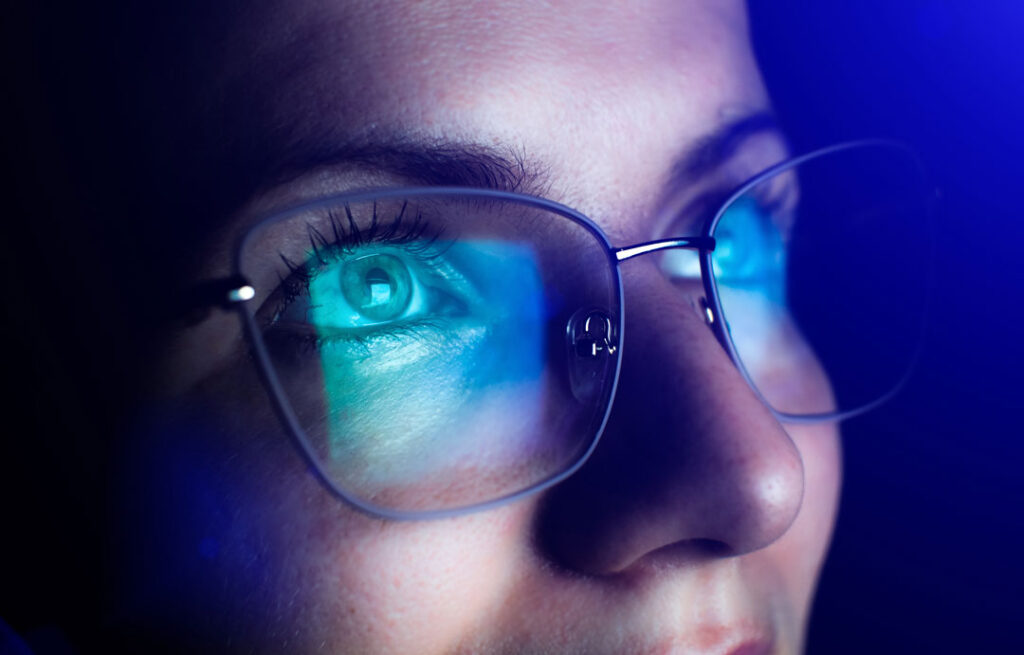Benefits of Blue Light-Blocking Glasses
- by Tracey L. Kelley
- Updated: March 26, 2024
Table of Contents

When on a quest for effective sleep remedies, it’s always helpful to delve a little deeper into the research, and this is especially true regarding blue light-blocking glasses. The prevalence of time spent on tablets, laptops, and smartphones in the early 2000s raised concern about how much blue light from these devices affected our eyes and sleep patterns, so blue light-filtering glasses became all the rage.
Here’s the bottom line: wearing “blue blockers” won’t necessarily hurt your eyes — but they don’t exactly help, either. Let’s take a closer look.
Note: The content on Sleepopolis is meant to be informative in nature, but it shouldn’t be taken as medical advice, and it shouldn’t take the place of medical advice and supervision from a trained professional. If you feel you may be suffering from any sleep disorder or medical condition, please see your healthcare provider immediately.
Long Story Short
- Exposure to blue light at night is potentially one of many reasons for sleep disruption, but not the only.
- The American Optometric Association and the American Academy of Ophthalmology suggest that while special glasses might help with computer vision syndrome (eye strain), there are numerous other solutions that should be considered.
- An overwhelming amount of research currently doesn’t support benefits for the general population to wear blue light-blocking glasses for better sleep or reduced eye strain.
What Is Blue Light?
All the light you see is a combination of colors, from green to red to violet. “Blue light represents a particular wavelength of light in the visible light spectrum,” Dr. Fiona H. Barwick, director of the Sleep & Circadian Health Program at Stanford University, tells Sleepopolis. “It’s considered a higher frequency or shorter wavelength light.” It appears in every light source, including sunlight, LED and fluorescent lamps, and all electronic devices.
Potential Problems Caused by Blue Light
Blue Light And Sleep Challenges
Studies indicate that blue light exposure matters a great deal. During the day, it can help you feel wide-eyed and bushy-tailed, but it’s not so great in the evening or at night when it may negatively affect the circadian system and sleep. (1)
The Circadian Rhythm, Defined
The circadian rhythm, also known as your internal clock, helps regulate your sleep-wake cycle and is heavily influenced by exposure to light and darkness. It’s the system that makes you feel sleepy at night and awake come daytime.
Barwick explains that light impacts our circadian rhythms and behaviors, “including wake-sleep, activity-inactivity, and feeding-fasting.” She adds, “Blue-green light sends the strongest signal for daytime rhythms to our circadian pacemaker.” (2) Regular exposure to natural blue light improves mood and alertness. So why block it?
Melatonin increases in the evening, usually about two or three hours before bedtime, while cortisol and body temperature decrease to help us transition from wakefulness to sleep. Blue light is one culprit that can suppress and delay melatonin (3) and “prevent the decreases in cortisol and body temperature that are necessary for healthy sleep,” Barwick notes.
Blue Light, Screentime, and Eye Strain
Additionally, “blue-enriched light from screens appears to cause eye strain because the shorter wavelength causes a shift in focus from the center to just in front of the retina, which can lead to fatigue,” (4) she says. But the blue hue isn’t necessarily the only reason for discomfort.
“Simply staring at a screen can cause eye strain because eye-blinking is reduced from 15x per second to 5–7x per second, drying out our eyes and leading to fatigue,” (5) she explains. “Not surprisingly, the more time you spend on screens (e.g., 12 hours vs. 4 hours) and the closer screens are to your eyes (e.g., phone vs. TV), the greater the potential for adverse effects.” (4)
So while you’re rubbing your irritated eyes, blue light is only one villain robbing you of comfort and sleep. Barwick says illuminance is another, as it represents the amount of light hitting a specified amount of surface area — think how much light from your phone screen is reflected on your face when you’re scrolling through social media before bed. The greater the amount, the more intense the light. Some people are able to reduce blue light electronic glare by activating a night mode filter, as this setting uses warmer tone colors and reduces overall brightness.
A Note on Digital Engagement
However, another reason you might be struggling to fall asleep comes courtesy of overstimulation by digital engagement. “Screen content also plays a role in sleep deprivation, as cortisol, our stress hormone, and dopamine, our pleasure and reward hormone, tend to be higher when viewing or streaming screen content, whether emails, social media, movies, or video games,” Barwick says.
Blue-Light-Blocking Glasses: Do They Really Work?
In an attempt to reduce the negative effects of curling up with the glow of our electronics at night, blue light-blocking glasses seemed to be the solution.
Manufactured with a special lens coating to reflect a percentage of blue light away from your eyes, this adaptive eyewear may help some people with perceived symptoms. Barwick says this might be because the filtered coating blocks light cues signaling alertness and wakefulness to the master pacemaker of our brain. “The benefits of blocking blue light are likely affected by individual and age-related differences in light sensitivity,” she adds.
However, a 2023 collective review of nearly 20 studies (6) reveals that “there was no evidence from RCT publications relating to the outcomes of contrast sensitivity, color discrimination, discomfort glare, macular health, serum melatonin levels, or overall patient visual satisfaction,” regarding blue light-filtering glasses.
Barwick adds that we’re more likely to be impacted by what she calls the “trifecta of screen-related sleep disruptors: blue light, illuminance, and content—which likely accounts for the inconsistencies in current research and the “lack of consensus on how blue light impacts sleep and the benefits of wearing blue light-blocking glasses.”
What Else Can I Do?
If you think your habits might be keeping you up at night, it may be time to reassess your sleep hygiene routine if you’re experiencing sleep trouble, paying close attention to other rest-prohibitive habits such as eating too much before bedtime or not having a regular sleep/wake schedule to help reset your circadian rhythm. A few tweaks could provide noticeable improvement in just a few days.
Additionally, “the surest bet for getting a good night’s sleep is to set up a 30-60 minute screen-free buffer zone before bedtime and to ensure plenty of outdoor light exposure during the day,” (7) Barwick advises.
Buying Blue-Light-Blocking-Glasses
The American Optometric Association (AOA) indicates that many people struggle with computer vision syndrome (CVS) (5), or digital eye strain. The organization states that one solution to eye fatigue, headaches, and blurred vision might be “special lens tints and coatings that can reduce the harmful impact of blue light,” in addition to installing anti-glare screens and better desk lighting. However, the organization doesn’t distinctly recommend blue light-blocking glasses, even while reading at night.
The American Academy of Ophthalmology is more succinct regarding the topic: “Several studies (7) suggest that blue light-blocking glasses do not improve symptoms (8) of digital eye strain. The American Academy of Ophthalmology does not recommend blue light-blocking glasses because of the lack of scientific evidence that blue light is damaging to the eyes.”
If you already use or think you need corrective lenses, talk with an optometrist about the specific demands of your work. You might have to switch to eyewear designed for extensive computer viewing, alternating between general reading or distance-vision glasses if necessary.
Another helpful tip for minimizing eye strain? The AOA suggests blinking more, (9) as we simply don’t do it enough while staring at our screens, which causes the dryness and fatigue Barwick mentioned above.
How Much Do Blue-Light-Blocking Glasses Cost?
If you’d like to try blue light-blocking glasses during the day while using digital devices, keep in mind you may not notice much of a difference in CVS symptoms. Lighter-toned lenses are typically for daytime use, while darker orange, red, or brown lenses are usually for nighttime use.
Fortunately, you won’t have to break the bank with this experiment — the average off-the-shelf pair of blue blockers is about $15–$25. However, if you add tints to your prescription lenses or designer frames, you’ll likely spend up to $50 or more.
FAQs
How do you test blue light-blocking glasses?
The most accurate way is with a spectrometer or light pulse monitor, but few of us have this lab equipment at home. (13) Some crowdsourced recommendations include holding lenses up to a lamp, and if you see a blue reflection through them, then they might be helpful. Better still, before purchasing blue light-filtering glasses, request information from the manufacturer.
The Last Word From Sleepopolis
“To date, there’s no consistent evidence supporting the effectiveness of blue light-blocking glasses in improving sleep quality, let alone reducing eye strain or fatigue,” (10, 11) Barwick says. “The studies done to date are small and subject to bias and thus placebo effects, as control conditions often use differently colored lenses.”
Sleepopolis offers numerous tips for better sleep, and the AOA’s 20-20-20 rule (12) might alleviate eye strain more quickly—and it’s free. Every 20 minutes, simply take a 20-second break to look at something different 20 feet away.
Sources
- Wahl S, Engelhardt M, Schaupp P, Lappe C, Ivanov IV. The inner clock-Blue light sets the human rhythm. J Biophotonics. 2019;12(12):e201900102. doi:10.1002/jbio.201900102
- PNAS. The photobiology of the human circadian clock. Accessed March 20, 2024. https://www.pnas.org/. doi: epdf/10.1073/pnas.2118803119.
- Wong NA, Bahmani H. A review of the current state of research on artificial blue light safety as it applies to digital devices. Heliyon. 2022;8(8):e10282. Published 2022 Aug 15. doi:10.1016/j.heliyon.2022.e10282
- Cougnard-Gregoire A, Merle BMJ, Aslam T, et al. Blue Light Exposure: Ocular Hazards and Prevention-A Narrative Review. Ophthalmol Ther. 2023;12(2):755-788. doi:10.1007/s40123-023-00675-3
- Computer vision syndrome (Digital Eye Strain). AOA.org. Accessed March 20, 2024. https://www.aoa.org/healthy-eyes/eye-and-vision-conditions/computer-vision-syndrome?sso=y.
- Singh S, Keller PR, Busija L, McMillan P, Makrai E, Lawrenson JG, Hull CC, Downie LE. Blue‐light filtering spectacle lenses for visual performance, sleep, and macular health in adults. Cochrane Database of Systematic Reviews 2023, Issue 8. Art. No.: CD013244. DOI: 10.1002/14651858.CD013244.pub2. Accessed 11 March 2024.
- Burns AC, Saxena R, Vetter C, Phillips AJK, Lane JM, Cain SW. Time spent in outdoor light is associated with mood, sleep, and circadian rhythm-related outcomes: A cross-sectional and longitudinal study in over 400,000 UK Biobank participants. J Affect Disord. 2021;295:347-352. doi:10.1016/j.jad.2021.08.056
- Do blue-blocking lenses reduce eye strain from extended … Accessed March 20, 2024. https://www.ajo.com/article/S0002-9394(21)00072-6/abstract.
- The benefits of blinking. AOA. Accessed March 11, 2024. https://www.aoa.org/news/clinical-eye-care/health-and-wellness/the-benefits-of-blinking?sso=y.
- Jeremy A. Bigalke MS a b, a, b, et al. Effect of evening blue light blocking glasses on subjective and objective sleep in healthy adults: A randomized control trial. Sleep Health. March 8, 2021. Accessed March 20, 2024. https://www.sciencedirect.com/science/article/abs/pii/S2352721821000127.
- Vagge A, Ferro Desideri L, Del Noce C, Di Mola I, Sindaco D, Traverso CE. Blue light filtering ophthalmic lenses: A systematic review. Semin Ophthalmol. 2021;36(7):541-548. doi:10.1080/08820538.2021.1900283
- 20-20-20 rule and Digital Eye Strain. Accessed March 11, 2024. https://www.aoa.org/AOA/Images/Patients/Eye%20Conditions/20-20-20-rule.pdf.
- Alzahrani HS, Khuu SK, Roy M. Modelling the effect of commercially available blue‐blocking lenses on visual and non‐visual functions. Clinical and Experimental Optometry. 2019;103(3). doi:https://doi.org/10.1111/cxo.12959
Barwick, Fiona. Personal Interview. March 2023.
Subscribe Today!
Get the latest deals, discounts, reviews, and giveaways!
